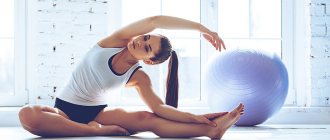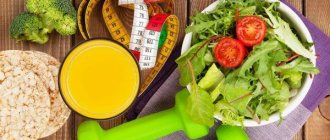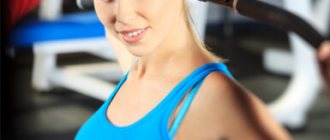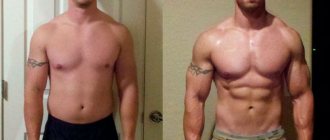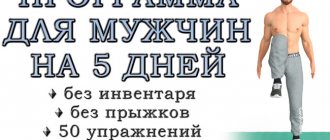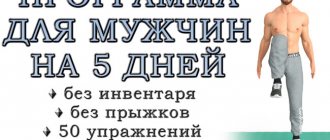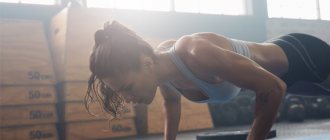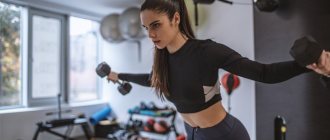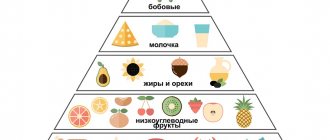- Drinking regimen during training
- Breakfast
You can go to the gym to maintain good health, lose weight or build muscle mass. But without a properly developed nutrition plan, it will not be possible to achieve positive results. And in order for training in the gym or at home to please you with changes in your figure, you need to know how to eat properly during training
.
How to eat before a workout to lose weight
To lose weight, you need to properly organize your diet. You should not fast, especially before training. The body must have enough strength to work in the gym or when doing exercises at home.
Meals before training are organized taking into account several rules:
- Food should be light, mostly carbohydrates. Porridge is ideal for this.
- The last meal should take place 2 hours before training.
- You are allowed to drink kefir or eat an apple 30 minutes before.
To start the fat burning process, it is recommended to drink a cup of coffee before training. The drink will give you a boost of energy and help jump-start your metabolism.
What is suitable as a pre-workout meal for weight loss:
- porridge with water or milk;
- fruit and vegetable salads;
- breads.
Be sure to count calories - they should not be more than 200 for women and 300 for men.
Before training, take special supplements - thermogenic fat burners. Their action is aimed at increasing body temperature, thereby triggering fat burning mechanisms. What supplements can you buy:
- Nutrex Lipo-6 Black Ultra Concentrate. The active substance is caffeine. This thermogenic helps burn fat, increases endurance and improves mental focus.
- Nutrex Lipo-6X. The basis of this supplement is a unique multi-stage technology, thanks to which the substances are delivered gradually. This leads to rapid weight loss, increased physical strength and endurance.
- Olimp Thermo Speed Extreme. Suitable for those who want to lose weight and gain muscle mass. The supplement acts in several directions, helping the body withstand heavy loads.
Weight loss supplements are not a mandatory part of losing weight. But with them, the fat burning process will go much faster.
Return to article content
Post-workout nutrition to burn fat
After training, you should not eat carbohydrates. This is due to the fact that during physical activity and within 2 hours after it, the body launches an active fat burning mechanism, which is necessary to replenish lost energy. If you eat any carbohydrate product, the production of glycogen will begin thanks to carbohydrates, and not fat reserves.
After classes you need proteins. They help muscles work, maintain the beauty and tone of muscles. Thanks to protein foods, you can lose weight and gain a sculpted figure.
What can you eat after training:
- low-fat cottage cheese without additives;
- lean beef;
- chicken breast;
- egg whites;
- rabbit meat;
- lean fish.
You can always have a protein bar on hand that will satisfy your hunger and help overcome fatigue. For example:
- Power System Big Block 50%. A high-quality protein bar containing 50 g. squirrel. Ideal for a snack.
- VP Laboratory 40% High Protein. The composition contains 40 g. protein and only 18 grams. carbohydrates. Great for people who are losing weight.
- 32 Protein from Ironman. 32% consists of protein. It tastes good.
Special attention is paid to nutrition after training. It is important not to overeat and not exceed the calorie limit. It is important to remember the rules of fractional meals - often and in small portions.
Return to article content
How to stay hydrated
Drinks also need to be chosen correctly. Before training, you should exclude dairy drinks, sweet juices, any carbonated drinks (including water), and, of course, alcohol. One and a half to two hours before the start of the lesson, it is recommended to drink 500-600 ml of water (you can drink unsweetened green tea, tea with mint and basil, light unsweetened fruit drink), 250 ml after warming up and, depending on the intensity of the workout, up to 500 ml of water during classes. This is necessary to protect the body from dehydration.
In order for training in the gym to give good results without compromising your health, you should take a responsible approach not only to the set of classes, but also to the sports nutrition regimen. In fitness centers, professional instructors are always ready to give recommendations on an individual diet.
Why is it important to drink a lot of water?
Water is very important for the normal functioning of the entire body. Those who engage in intense sports require 2 times more fluid. Moreover, you should not focus on thirst - during physical exercise this feeling is dulled and appears only when dehydrated.
If you do not follow the drinking regime, your metabolism will slow down, your health will worsen, and your performance will decrease. And this will interfere with losing weight and gaining muscle mass.
Please note that if symptoms of dehydration occur, you should stop training and replenish the lack of fluid in the body. For this, regular, still water is used. Juices, smoothies and other drinks are not suitable alternatives.
Symptoms of dehydration include:
- dry mouth and skin;
- headache;
- dry lips;
- dizziness;
- weakness;
- nausea;
- irritability.
If you do not drink enough water, the body will begin to accumulate it, turning on energy saving mode. And this slows down the process of losing weight and leads to weight gain.
Another reason to drink plenty of water is to protect your kidneys from protein damage. This rule applies to athletes who take protein supplements.
For those who want to lose weight, water is a natural way to detoxify the body. The liquid removes waste and toxins that cause excess weight gain.
Return to article content
Drinking regimen during training
It is important not only to focus on the feeling of thirst, but also to force yourself to drink more fluid. Active people need 2.5-3 liters of water daily. Accordingly, this norm should be distributed over several doses.
A mandatory rule for losing weight is to drink a glass of water after waking up and 30 minutes before each meal. Before training, the norm is 0.5 liters. After exercise, to replenish lost fluid, you need to drink about 3 glasses of water.
You can also drink water during training. Take breaks every 15 minutes to drink a couple of sips of water. It is allowed to drink milk or natural, freshly squeezed juice without added sugar.
Return to article content
Nutritional features depending on training goals
There are 3 main goals for which people make exercise a part of their lives: burning fat, increasing muscle mass and maintaining their achieved shape. Different goals require different distributions of protein, fat and carbohydrates in the body.
Fat Burning
protein: 50%, fats: 30% carbohydrates: 20%.
If your goal is to lose weight, first of all you should limit the amount of carbohydrates you eat in general, and minimize the share of fast carbohydrates. Eat a low-carb diet for most meals, with carbohydrates consumed as part of breakfast.
Weight gain
protein 30%, fats 40%, carbohydrates 30%
Protein is the basis of muscles. Make sure you get high-quality protein from your diet (meat, dairy products, nuts). When gaining weight, carbohydrates are no less important. The quality of incoming carbohydrates affects the quality of the mass.
Menu: meal plan
Regardless of the goal of training (weight loss or weight gain), you will need to switch to proper nutrition, which performs several functions:
- normalization of metabolism;
- normalization of sugar and cholesterol;
- elimination of fat layer;
- muscle strengthening;
- creating a beautiful relief on the body;
- increasing endurance and physical strength.
It is impossible to eat only hamburgers and have a beautiful figure. However, proper nutrition does not mean giving up delicious foods. There are a huge number of recipes for preparing delicious and healthy food. For example, you can make your favorite hamburger yourself using homemade tomato paste and mayonnaise, boiled meat, and bran bread.
When creating a menu, use a few useful tips
:
- Eat small meals, 5-6 times a day in small portions. This way, food is digested easier and faster, and enough calories are supplied to eliminate the feeling of hunger for a long time.
- Count the calories you eat
. To lose weight, a woman needs to consume from 1500 to 2000 calories per day, a man – from 1800 to 2300 calories. To gain muscle mass, a woman needs from 2000 to 2200 calories, a man - from 2300 to 2600 calories. - Don't give up fat. A balanced diet involves consuming 50% carbohydrates, 25% proteins and 25% fats. To lose weight, the norm of carbohydrates and fats is reduced - 40% and 15%, respectively.
- For snacks, use low-calorie foods - vegetables, fruits, dairy products.
- Avoid alcohol. Any type of alcoholic beverages negatively affects the process of losing weight and gaining muscle mass. A small amount of dry red wine is allowed.
- Avoid sugar and flour dishes. These products slow down metabolism, which is unacceptable for an active person.
By following these rules, you can create a menu consisting only of healthy foods.
Return to article content
Breakfast
Breakfast gives the body energy for the whole day, so you shouldn’t skip it. The first meal should take place within an hour of waking up so that the body does not trigger the energy-saving mechanism and does not begin to accumulate fat.
For breakfast you need to eat carbohydrates, fiber and proteins. A small amount of whole grain bread is allowed.
Here are some delicious and nutritious breakfast options:
- Buckwheat porridge with milk, toast with cheese, green tea. A glass of milk (second breakfast)
. - Oatmeal in water with dried fruits, coffee. Natural yogurt, apple
(second breakfast). - Baked cottage cheese pancakes with sour cream, fermented baked milk. Banana (second breakfast).
After second breakfast, you can snack on nuts, a piece of cheese, or any vegetable.
Return to article content
Dinner
Lunch should be hearty and nutritious, containing fats and proteins. The main thing is to chew your food thoroughly and take your time. Ideal lunch option - soup, main course
and a drink that should be consumed 30 minutes after eating.
Here are some menu options:
- Mushroom soup with potatoes, pasta with minced meat, tea with toast.
- Broccoli puree soup, chicken breast baked with zucchini, dried fruit compote.
- Fish soup, rice with salmon, vegetable salad, green tea.
- Borscht in vegetable broth, steamed chicken cutlet, mashed potatoes, freshly squeezed juice.
Return to article content
Dinner
Dinner should be light and low in calories. For example, 100 g chicken, salad
from vegetables, tea. This is enough to satiate and eliminate the feeling of hunger until the morning.
Like breakfast, the first meal is taken at approximately 18:00, the second - 2 hours before bedtime. Dinner options:
- Chicken fillet, vinaigrette, black tea. Late dinner - natural yogurt.
- Zucchini stuffed with rabbit meat, compote. Second dinner - kefir.
- Fish casserole, cucumber and tomato salad, berry smoothie. Late dinner - fermented baked milk.
Return to article content
Table of "sports products"
We have already said that each sport requires adherence to a certain diet. For example, those who actively build muscle mass should consume foods containing proteins and easily digestible carbohydrates, those who develop endurance need to “lean” on complex, “slow” carbohydrates, and those who seek to increase strength require polyunsaturated fats etc.
Here is a table in which we consider the main food products that are useful for athletes of various disciplines:
| The product's name | Why is it useful? | Who is it useful for? |
| Chicken breast\\ turkey breast | protein (up to 25%), vitamins B3, B12, PP, phosphorus, magnesium | bodybuilders, powerlifters, track and field athletes, basketball players, etc. |
| Lean beef\\rabbit meat | protein, B vitamins, iron, calcium, potassium, various amino acids | weightlifters, bodybuilders, boxers, gymnasts, swimmers, etc. |
| Salmon | protein, the entire group of B vitamins, retinol, sodium, potassium, polyunsaturated fatty acids | crossfitters involved in team sports, yoga, zumba, etc. |
| Tuna | full complex of omega-3 fatty acids, vitamins D, E, manganese, zinc | powerlifters and other athletes for whom building muscle mass is important |
| Seafood (shrimp, mussels, squid, etc.) | easily digestible protein, vitamins E, A, H, B4, carotene | lovers of yoga, stretching, athletes who want to lose weight while maintaining muscle mass |
| Cottage cheese | casein, calcium, phosphorus, magnesium | bodybuilders, wrestlers, football players, volleyball players, etc. |
| Fermented milk products (kefir, fermented baked milk, yogurt) | vitamins B, A, H, PP, C, beta-carotene, choline, selenium, iodine, bifidobacteria, monosaccharides | weightlifters, bodybuilders, fitness enthusiasts |
| Cheese | protein (up to 50%), saturated fatty acids, calcium, sodium, copper | athletes who experience heavy muscle loads: crossfitters, dancers, cyclists, etc. |
| Chicken egg) | protein, vitamins A, E, thiamine, riboflamin, folic acid, iodine | bodybuilders during the “cutting” period, track and field athletes, volleyball players, boxers, etc. |
| Nuts | polyunsaturated fatty acids, oleic, linoleic, palmitic, linolenic acids | doing fitness, weightlifting, wrestling |
| Legumes (beans, chickpeas, lentils, peas) | ascorbic acid, vitamins PP, E, carotene, sulfur | lovers of yoga, Pilates, team sports, athletes participating in all-around events |
| Buckwheat | minerals – iron, zinc, iodine, malic acid, easily digestible protein | runners, cyclists, auto and motorcyclists, volleyball players |
| Whole grain flakes (oat, wheat) | dietary fiber, amino acids, sodium salts, vitamin C | active sports enthusiasts, track and field athletes, football players, equestrians |
| Brown rice | folic acid, phosphorus, zinc | climbers, boxers, aerobics enthusiasts |
| Green vegetables (spinach, lettuce, cabbage, green beans, cucumbers) | fiber, riboflavin. oxalic acid, vitamins C, K | athletes of all disciplines |
| Red vegetables (tomatoes, carrots, beets) | carotene, fiber, betaine, folic and ascorbic acids | boxers, wrestlers, biathletes, swimmers |
| Fruits (citrus fruits, unsweetened apples, pineapple) | fiber, pectin, vitamins C, E, P, potassium, magnesium | athletes of all disciplines |
These are just the most common, most commonly found foods that can benefit athletes. In practice, the choice of ingredients for a healthy and varied menu for any athlete is much larger.
